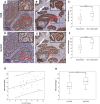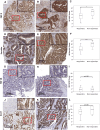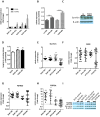FGF8 induces therapy resistance in neoadjuvantly radiated rectal cancer
- PMID: 30276721
- PMCID: PMC6326005
- DOI: 10.1007/s00432-018-2757-7
FGF8 induces therapy resistance in neoadjuvantly radiated rectal cancer
Abstract
Purpose: Therapy response to neoadjuvant radiochemotherapy (nRCT) of locally advanced rectal cancer varies widely so that markers predicting response are urgently needed. Fibroblast growth factor (FGF) and FGF receptor (FGFR) signaling is involved in pro-survival signaling and thereby may result in radiation resistance.
Methods: In a cohort of 43 rectal cancer patients, who received nRCT, we analyzed protein levels of FGF 8 and its downstream target Survivin by immunohistochemistry to assess their impact on nRCT response. In vitro resistance models were created by exposing colorectal cancer cell lines to fractionated irradiation and selecting long-term survivors.
Results: Our findings revealed significantly higher FGF8 and Survivin staining scores in pre-treatment biopsies as well as in surgical specimens of non-responsive compared to responsive patients. Functional studies demonstrated dose-dependent induction of FGF8 mRNA expression in mismatch-incompetent DLD1 cells already after one dose of irradiation. Surviving clones after one or two series of radiation were more resistant to an additional radiation fraction than non-irradiated controls and showed a significant increase in expression of the FGF8 receptor FGFR3 and of Survivin on both the RNA and the protein levels.
Conclusion: The results of this study suggest that FGF8 and Survivin contribute to radiation resistance in rectal cancer and may serve as markers to select patients who may not benefit from neoadjuvant radiotherapy.
Keywords: Fibroblast growth factor 8; Neoadjuvant radiochemotherapy; Rectal cancer; Survivin; Therapy response.
Conflict of interest statement
None of the authors have any conflict of interest to declare.
Figures



References
-
- Dammann K, Khare V, Harpain F, Lang M, Kurtovic A, Mesteri I, Evstatiev R, Gasche C (2015a) PAK1 promotes intestinal tumor initiation. Cancer Prev Res (Phila) 8:1093–1101 - PubMed
-
- de Rosa N, Rodriguez-Bigas MA, Chang GJ, Veerapong J, Borras E, Krishnan S, Bednarski B, Messick CA, Skibber JM, Feig BW, Lynch PM, Vilar E, You YN (2016) DNA mismatch repair deficiency in rectal cancer: benchmarking its impact on prognosis, neoadjuvant response prediction, and clinical cancer genetics. J Clin Oncol 34:3039–3046 - PMC - PubMed
MeSH terms
Substances
Grants and funding
LinkOut - more resources
Full Text Sources

